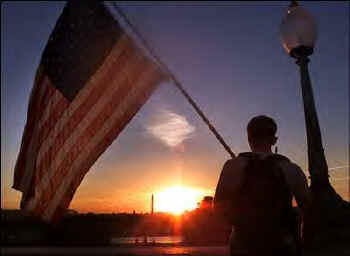

Star Spangled Banner
Author Unknown
So intense was the final bombardment that the early morning dawn was filled with smoke and the odor of burnt gunpowder. So thick was the curtain of smoke, that by 8 A.M. even the morning sunshine could not reveal whether or not the flag still waved. Then quiet returned. Mr. Key watched as the British ships began to withdraw. Had the fort, badly weakened by the enemy naval bombardment, finally fallen to the British ground troops?
His sloop alone in the bay, Francis Scott Key looked fearfully towards the shoreline. A breeze began to move across the water's surface and the smoke of battle began to shift ever so slightly to reveal patches of blue sky. And then, in the distant blue there appeared new colors....red and white....brief glimpses of the two-feet wide stripes of the Star Spangled Banner. Then a star appeared in the daytime sky, then another....then fifteen stars in the daytime. What a welcomed site they were. Mr. Key's heart swelled with hope, and pride in the men who had so valiantly fought through the night to keep that flag flying. Reaching into his pocket he withdrew an envelope and began to write his thoughts:
"O, say! can you see, by the dawn's early light,
What so proudly we hail'd at the twilight's last gleaming?
Whose broad stripes and bright stars, thro' the perilous fight,
O'er the ramparts we watched were so gallantly streaming?
And the rockets' red glare, the bombs bursting in air,
Gave proof thro' the night that our flag was still there.
O say! does that Star-Spangled Banner yet wave
O'er the land of the free and the home of the brave?"
As Mr. Key's sloop moved through the lifting curtain of battle-smoke towards Baltimore, the 35 year old attorney continued to work on his poem. Later in the day in his room at Baltimore's Indian Queen Hotel he cleaned up his copy on fresh paper, added a few more lines, and titled the 4 stanza treatise "Defense of Fort M'Henry." His brother-in-law saw the poem and had a local printer make copies. Within days a polished up version appeared in the "Baltimore American," then in other newspapers and publications. In time, the verses began to be sung to the tune of a popular English drinking song, "To Anacreon in Heaven."
Though Mr. Key wrote additional poetry in the years following the battle at Fort McHenry, none ever came close to the popularity or literary acclaim of his Star Spangled Banner. He never knew that his poem was our National Anthem. It was not officially recognized as such until 1931. None-the-less, it was immensely popular and brought Mr. Key considerable acclaim, which he dismissed with humility. Years after that historic battle he told an audience in his hometown of Frederick, Maryland:
"I saw the flag of my country waving over a city--the strength and pride of my native State--a city devoted to plunder and desolation by its assailants. I witnessed the preparations for its assaults. I saw the array of its enemies as they advanced to the attack. I heard the sound of battle; the noise of conflict fell upon my listening ear, and told me that 'the brave and the free' had met the invaders."
Francis Scott Key died in 1843 after a distinguished legal career which culminated with his service as the U.S. Attorney for the District of Columbia. Among his many cases was his role as prosecutor in 1835 in the case against Richard Lawrence, the first man to attempt to assassinate an American president when he attacked President Andrew Jackson armed with two pistols. Both misfired from a distance of 6 feet.
Previous Story Back to Calendar Next Story